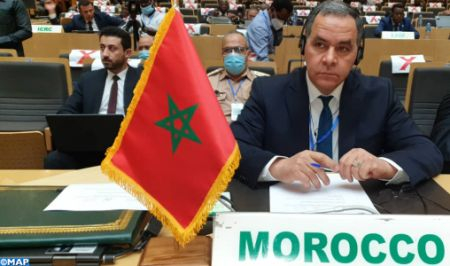AU PSC: Morocco Reiterates Link between Terrorists, Criminal Groups and Separatists
Morocco reiterated its position before the Peace and Security Council (PSC) of the African Union (AU) in Addis Ababa on Friday, highlighting the connections between terrorists and other criminal groups, separatists, and various entities associated with transnational organized crime. Speaking at a PSC’s meeting via videoconference, which was focused on reviewing the AU Commission Chairperson’s report on terrorism, Morocco’s Ambassador and Permanent Representative to the AU and UNECA, Mohamed Arrouchi, emphasized that the terrorist threat in Africa is deeply rooted and concerning. He lamented that over the past decade, the continent has incurred an economic loss of $171 billion due to terrorism, pointing out that Africa has borne the consequences of the influx of foreign terrorist fighters who have sought refuge on the continent. Arrouchi stated, “Our continent is experiencing something that is relatively rare elsewhere: collaboration, especially among terrorist groups, non-state armed groups, separatists, criminal gangs, and kidnappers for ransom, regardless of their ideological beliefs. They are becoming increasingly dangerous due to illicit financial flows and the proliferation of small arms and light weapons.” The link between terrorist groups, separatist groups, and transnational criminal organizations is a concerning trend, according to the Moroccan diplomat, and it warrants serious attention. He emphasized that understanding the nature of the threat is crucial to formulating appropriate responses. “We need to accurately diagnose the threat so that our responses are also appropriate. The PSC’s strategy should extend beyond just Daech and Al-Qaeda groups and address their connections with other criminal groups, separatists, bandits, organized criminal syndicates, and various groups involved in organized crime,” added Arrouchi. The Moroccan diplomat reiterated Morocco’s recommendation for the PSC “to promptly address the potential long-term consequences and address the perilous situation of cooperation and connections between terrorists and other criminal groups, separatists, and various entities involved in transnational organized crime.”

